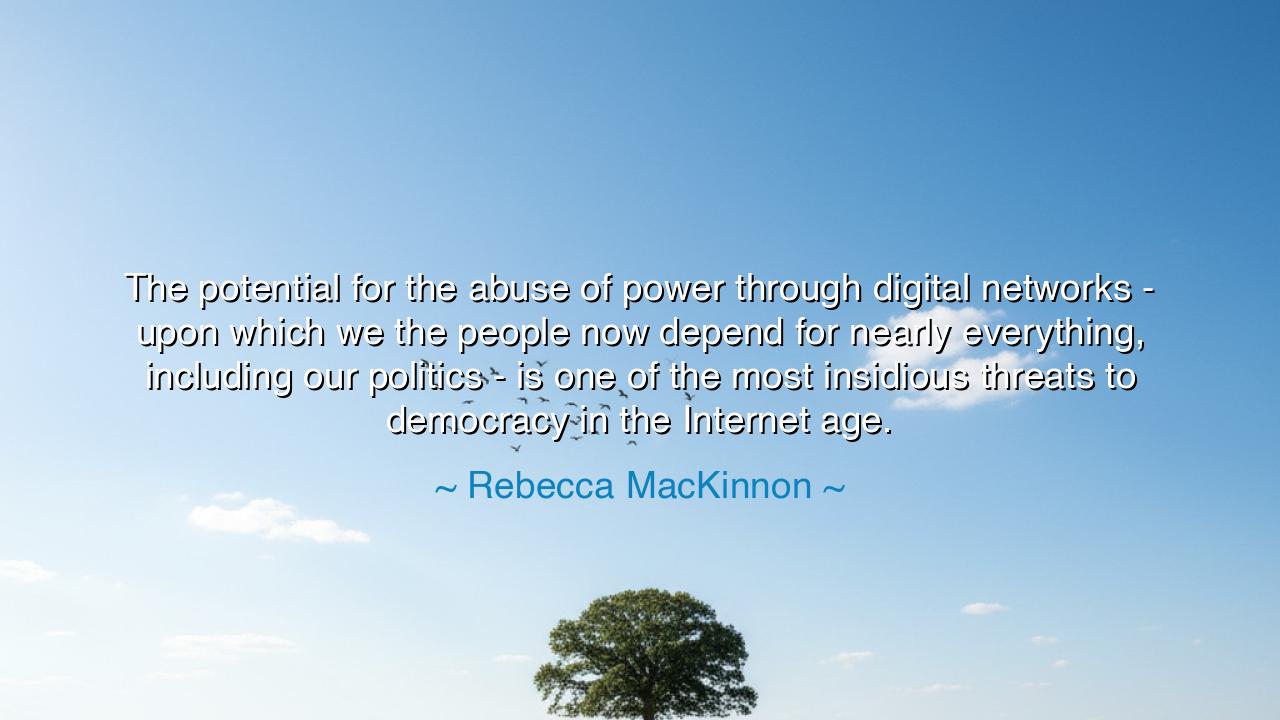
The potential for the abuse of power through digital networks -
The potential for the abuse of power through digital networks - upon which we the people now depend for nearly everything, including our politics - is one of the most insidious threats to democracy in the Internet age.






"The potential for the abuse of power through digital networks - upon which we the people now depend for nearly everything, including our politics - is one of the most insidious threats to democracy in the Internet age." – Rebecca MacKinnon
In the ever-expanding realm of the digital age, where knowledge flows freely and communication knows no bounds, there exists an unseen peril, one that threatens the very foundations of our freedom and democracy. Rebecca MacKinnon warns of the insidious threat that lies hidden in the vast network of digital technologies upon which we now depend for nearly every aspect of our lives—from how we communicate, to how we vote, and how we govern ourselves. The ability to connect with others has never been more powerful, yet with this power comes the temptation for abuse—a temptation that, when unchecked, can undermine the very principles upon which our societies are built.
The ancients understood the dangers of concentrated power, even in the most open and transparent of systems. Consider Plato's "Republic," in which he warned of the inherent dangers of those in positions of authority. Plato, in his timeless wisdom, understood that power could corrupt, especially when it was wielded without checks or balance. In the ideal republic, power was meant to be distributed, kept accountable, and always in service to the common good. But, just as MacKinnon observes, the digital realm has created new avenues for control—ways in which power can be abused on a scale that Plato could never have imagined, but that would have resonated with his concerns about tyranny and misuse of authority.
The ancient story of Julius Caesar offers a stark example of how unchecked power can lead to the destruction of democratic values. Caesar’s rise, fueled by his charisma and political prowess, saw him gain overwhelming control over the Roman Republic. Though he was hailed as a leader by some, his centralization of power ultimately led to the collapse of the Republic and the rise of the Roman Empire, where authority was no longer held in check by the Senate or the people. His rule exemplifies the corrupting influence of absolute power, a phenomenon that today takes on a new form in the digital world—where information and influence can be manipulated on a vast scale.
In our modern age, the digital networks that connect us—the very platforms on which our politics, our economies, and our social lives depend—have become the new battlegrounds for power. These platforms, while initially created to foster connection and communication, now serve as tools for surveillance, manipulation, and control. MacKinnon’s warning is not just about the threats posed by authoritarian governments, but also about the massive corporations that wield vast amounts of data and have the power to influence our lives without our knowledge or consent. Social media, search engines, and other digital platforms are not neutral tools; they are systems that can be used to shape perceptions, control narratives, and ultimately undermine democracy.
The story of the Cambridge Analytica scandal offers a chilling example of how the manipulation of data can undermine democratic processes. During the 2016 U.S. presidential election, it was revealed that personal data harvested from millions of Facebook users had been used to target them with personalized political ads. This manipulation of information was done without the knowledge or consent of the individuals involved, and it played a significant role in shaping public opinion and influencing the outcome of the election. This is the abuse of power that MacKinnon warns against—the ability of powerful entities to control the flow of information, to target individuals based on their personal data, and to steer the course of democracy in ways that are hidden from the public eye.
MacKinnon’s call to action is a clarion warning for all of us. The power of digital networks is not inherently bad, but without careful oversight and accountability, it can be twisted into a tool of control and manipulation. Just as ancient societies understood the need for balance and accountability in power structures, so too must we recognize the importance of transparency in our digital systems. The ability to access information, to communicate freely, and to participate in politics must be safeguarded from those who would exploit these tools for self-interest or control.
The lesson here is clear: in the digital age, we must remain vigilant in defending the integrity of our democracy. We must demand transparency from the platforms that shape our lives, ensuring that they serve the common good rather than the interests of the few. We must take responsibility not only for how we engage with these technologies, but for how we hold them accountable. By doing so, we can protect the values of freedom and democracy that have defined humanity’s greatest achievements. The age of the digital network is one of immense opportunity, but it is also a time of great responsibility—a responsibility we must all share if we are to ensure that the power we wield does not become the very thing that threatens our freedom.






AAdministratorAdministrator
Welcome, honored guests. Please leave a comment, we will respond soon